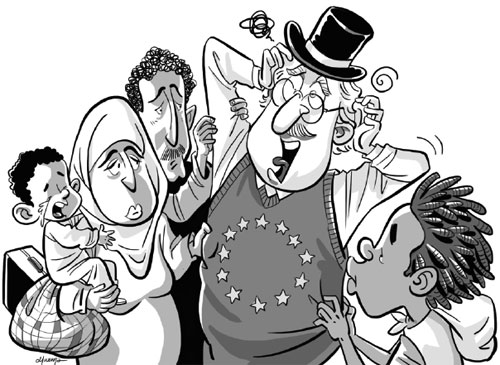Lesson to be learned from EU's refugee influx
The desperate attempts of refugees to enter Europe have caught the world's attention, and China has a lesson to learn from it. The refugees are mainly from the war-torn Middle East and North Africa, and unlike immigrants seeking a better life, they just want food and safety. That's why the European countries are in a dilemma: whether or not to grant them asylum.
Some countries in Eastern and Southern Europe, where the refugees have concentrated, have their own economic problems and cannot afford to take in the refugees. Still, they cannot send them back to their countries. It is possible that in the future, the refugees will become a big problem for Europe and could even trigger large-scale social unrest.
But what Europe faces today, China could face in the future. Thanks to more than three decades of fast-paced economic development, China offers better job opportunities and quality of life than some of its neighbors. And since some countries and regions around China face high political risks, it is possible that a large number of refugees will line up at China's border in search of safety and a better life.
At present, China faces refugee problems mainly in the northeastern and southwestern regions. Yet after the ongoing infrastructure development projects to connect China and Central Asia and South Asia are completed, refugee pressure is likely to be felt in these regions too.
China should, therefore, draw some lessons from Europe about handling the refugee problem. To begin with, the country should try to help the neighboring countries to create stable political and economic conditions, and economic development is the best way to ensure people live in peace and have better livelihoods.
Most of the refugees now waiting to enter Europe are from Libya and Syria. The turmoil in the two countries is a direct result of the United States' and some European countries' intervention to spread democracy. But in some developing countries, the so-called democratic reform can release people's pent-up anger against the existing situation that can lead to a humanitarian crisis, something that has happened in countries like Libya and Syria.
The West has tried to enforce such reform in Afghanistan, Myanmar, Cambodia and some Central Asian countries, all of which are China's neighbors. To avoid the resultant humanitarian crisis, China should, following its non-intervention policy, help these countries build stable societies and prevent large-scale refugee outflows.
Also, following the humanitarian principle, China should promote cultural convergence at home. After refugees in large numbers enter a country, it is difficult to repatriate them. For big countries such as China, sending back refugees to their chaotic homelands is fraught with political implications. Under such circumstances, assimilating the newcomers into Chinese society will become a big problem. It is thus imperative that China not follow the European countries' multiculturalism principle and insist on cultural assimilation, in a bid to prevent a parallel society from developing in the country. If not, an influx of refugees could aggravate the multicultural set-up of China and escalate ethnic tensions.
Besides, China should view the refugee issue objectively. Although the influx of refugees will be an added burden on China, it would strengthen China's links with the international community, for it could transform it from a nation state in the Western political discourse to a global country. Therefore, China should properly handle the refugee issue if and when it emerges, for it would help its peaceful rise on the world stage.
The author is a researcher of international politics at Beijing-based University of International Relations.
|
Li Min / China Daily |



















